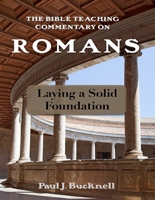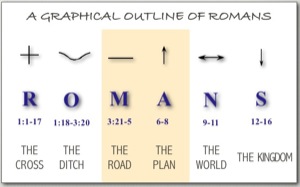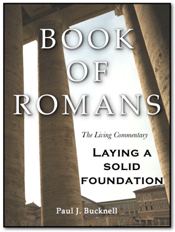
Romans: Laying a Solid Foundation
The Bible Teacher's Commentary
Paul J. Bucknell
Summary of Romans 3:21-8: An Extensive Summary (2/3)
Romans 1-3:20: Read |Audio mp3 | Video/slides | ppt
Romans 3:21-8: Read | Audio mp3 | Video/slides | ppt
Romans 09-16 : Read | Audio mp3 | Video/slides | ppt
 Every Bible book including Romans has its specialized purposes. The Book of Romans was designed to lay a solid foundation for our Christian faith. If the foundation is built right, then the whole building (the Christian life) can be strong. Romans 3:21-5:21 clearly defines the Gospel while chapters 6-8 warns us of a number of wrong understandings that would strip the Gospel of its glorious saving power.
Every Bible book including Romans has its specialized purposes. The Book of Romans was designed to lay a solid foundation for our Christian faith. If the foundation is built right, then the whole building (the Christian life) can be strong. Romans 3:21-5:21 clearly defines the Gospel while chapters 6-8 warns us of a number of wrong understandings that would strip the Gospel of its glorious saving power.
An Extensive Summary of Romans 3:21 - 8 is the second of three parts summarizing the Book of Romans discussing both Romans 3:21-5 and 6-8.
C. Righteousness Made: Justification (Romans 3:21-5:21)
God presents us as righteous before God
through faith in Christ.
Romans 3:21-31 presents the means through which we secure that needed righteousness - through faith in Christ. Chapter 4 illustrates how salvation by faith is taught through Old Testament men and scriptures. Chapter 5 goes one step further by demonstrating both Jews and Gentiles are true children of Abraham because they received the blessings associated with righteousness.
 Man will never obtain that needed righteousness through the Law. The law only reveals our sin. Instead it is through Christ's righteousness through which Jew or Gentile can find hope of salvation. We are sinners and need to find that righteousness (declared righteousness) through the redemptive work of Christ. Jesus died on our behalf. He suffered our penalty of death on our behalf so that those who have faith in Christ not only find forgiveness but also gain His righteousness which enables us to come before God's majestic presence (5:1-2).
Man will never obtain that needed righteousness through the Law. The law only reveals our sin. Instead it is through Christ's righteousness through which Jew or Gentile can find hope of salvation. We are sinners and need to find that righteousness (declared righteousness) through the redemptive work of Christ. Jesus died on our behalf. He suffered our penalty of death on our behalf so that those who have faith in Christ not only find forgiveness but also gain His righteousness which enables us to come before God's majestic presence (5:1-2).
"For all have sinned and fall short of the glory of God, being justified as a gift by His grace through the redemption which is in Christ Jesus" (Romans 3:23-24).
Paul uses three illustrations in chapter 4 to prove 'salvation by faith' to the unbelieving Jews.  Abraham was declared righteous before the Law (4:3). David greatly sinned and was guilty before the Law but found his sins covered (4:7). Abraham received acceptance before God through his faith before he was circumcised.
Abraham was declared righteous before the Law (4:3). David greatly sinned and was guilty before the Law but found his sins covered (4:7). Abraham received acceptance before God through his faith before he was circumcised.
In Romans 4:13-25 he continues establishing how that same faith not only can save Jews but also those from any nation.
"For the promise to Abraham or to his descendants that he would be heir of the world was not through the Law, but through the righteousness of faith" (Romans 4:13).
People do not receive this righteousness through works but like Abraham through faith. God promised Him to be "heir of the world.' In other words, Abraham was a "father of many nations.'
In chapter 5 Paul expands on the blessing of that inheritance. The blessings are the proof of having obtained that righteousness through faith. It is through our justification by faith (5:1) through which many are saved and blessed. 5:12-21 summarizes this section by highlighting our sinful dilemma through our joint guilt through Adam (pointing out again our unrighteousness) but also the common blessing of life in found in the Jesus Christ, the second Adam.
"That, as sin reigned in death, even so grace might reign through righteousness to eternal life through Jesus Christ our Lord" (Romans 5:21).
Righteousness with all its blessings are for all who believe in Christ. Without Christ and His life, we are still linked to Adam and his judgment.
![]()
D. Righteousness Attained: Sanctification (Romans 6-8)
The Lord calls us to live out righteous lives
by Christ's power within us.
Paul carefully eliminates the most dangerous misunderstandings (chapters 6-7) which arise upon the biblical teaching of justification by faith before going on in Romans 8 to positively state the Christian's relationship with God through Jesus Christ.  The apostle Paul needs to clear up this possible confusion before further developing the impact of justification of faith in our lives.
The apostle Paul needs to clear up this possible confusion before further developing the impact of justification of faith in our lives.
Paul changes his focus as he comes to chapter 6 and beyond. He is no longer trying to prove that a man is a sinner but guides the believer into an increasingly righteous life by pointing to Christ's power within him. He does not mention any second experience to obtain God's full promises. Instead the apostle persistently presents counter arguments to keep the believer from being negatively affected through false teaching.
 Righteousness is an outgrowth of faith in Christ. This is not a pure righteousness through which one is saved but a righteous lifestyle that results from salvation. This is the blessings we see promised to every believer in chapter 5.
Righteousness is an outgrowth of faith in Christ. This is not a pure righteousness through which one is saved but a righteous lifestyle that results from salvation. This is the blessings we see promised to every believer in chapter 5.
A genuine believer in Christ will increasingly live out a righteous life as he increases in his understanding of the truth and applies those truths to his life.
Falsehood, however, surrounds God's people. The evil one is constantly finding situations to deceive God's people through distorted teachings. The repetitiveness of four "may it never be!" phrases in chapters 6 and 7 shapes this section. Paul tries to eliminate the impact of each false interpretation before it has a chance to carry out its harmful influence.
In chapter 8 Paul builds upon the declaration of our righteous standing in Christ through faith and begins to show its effect on our lives. The Law could not make us righteous as we were devoid of the Spirit of God, but now that has all changed, having believed in Christ.
8:1-11 shows how one is freed from the power of the flesh (old nature) and empowered by the love, power and life of the Spirit of God. 8:12-17 displays how having escaped the clutches of the flesh, we are now led by the Spirit of God as the children of God (blessing from chapter 5).
Christ satisfied the law's claim on our lives and so now the principle or rule of the Spirit of life takes over control of our lives. We run by a different operating system (law).
8:18-39 continues on with a different focus on the question of suffering. Paul introduces suffering in 8:17, "And if children, heirs also, heirs of God and fellow heirs with Christ, if indeed we suffer with Him in order that we may also be glorified with Him." A question arises, "If we have become children of God and empowered by the Spirit of God, then why do we still suffer? Are we not to enjoy the blessings of new life?" Paul then sets before us in this last part of chapter 8 an amazing ring of statements that assure us that having identified ourselves with Christ, we also will need to suffer with Him.
Paul tackles three hard questions for those who are suffering in this last section:
-
"Can I endure (8:26-27)?"
-
"Is God really in control (8:28-30)?"
-
"Does He really love me (8:31-39)?"
By providing a picture of God's eternal redemptive plan, we see that God is eternally committed to our well-being despite our sinful past. If God spared His only Son for us so that we could gain life, will He not provide all that we need to endure the stresses and troubles of life? (8:32). Of course. Nothing shall separate from God's eternal love for us.
![]()
"But in all these things we overwhelmingly conquer
through Him who loved us" (Romans 8:37).
As we avoid the false teachings that drag us into sin and doubt, we can through the power and love of the Holy Spirit live out an increasingly righteous life. This is God's gift to us!
![]()
Good to know that God did not stop here declaring our guilt but went on showing us the solution to our sin and guilt!
Continue on to the third and last summary.
BFF -> Moving our generation's heart and mind closer to the Lord through the powerful truth of God!








